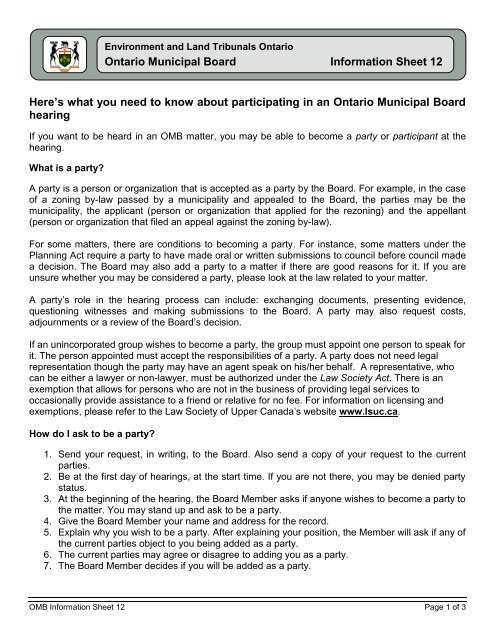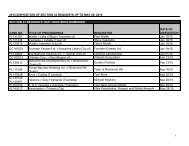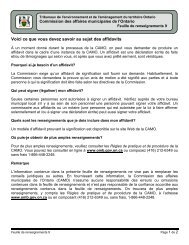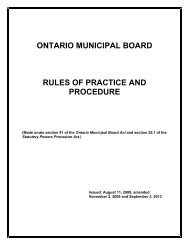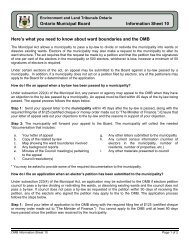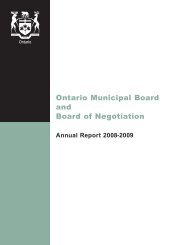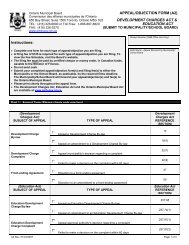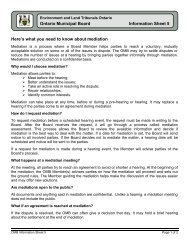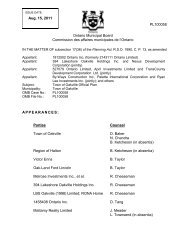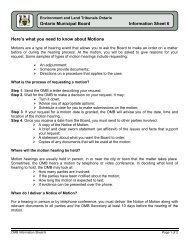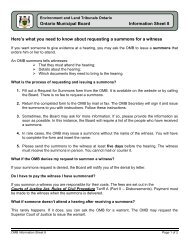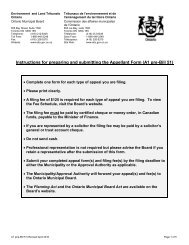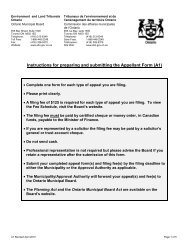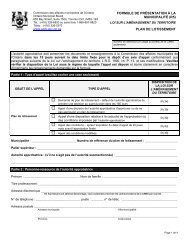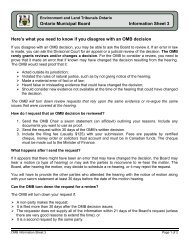Party and Participant (PDF) - Ontario Municipal Board
Party and Participant (PDF) - Ontario Municipal Board
Party and Participant (PDF) - Ontario Municipal Board
Create successful ePaper yourself
Turn your PDF publications into a flip-book with our unique Google optimized e-Paper software.
Environment <strong>and</strong> L<strong>and</strong> Tribunals <strong>Ontario</strong><br />
<strong>Ontario</strong> <strong>Municipal</strong> <strong>Board</strong> Information Sheet 12<br />
Here’s what you need to know about participating in an <strong>Ontario</strong> <strong>Municipal</strong> <strong>Board</strong><br />
hearing<br />
If you want to be heard in an OMB matter, you may be able to become a party or participant at the<br />
hearing.<br />
What is a party?<br />
A party is a person or organization that is accepted as a party by the <strong>Board</strong>. For example, in the case<br />
of a zoning by-law passed by a municipality <strong>and</strong> appealed to the <strong>Board</strong>, the parties may be the<br />
municipality, the applicant (person or organization that applied for the rezoning) <strong>and</strong> the appellant<br />
(person or organization that filed an appeal against the zoning by-law).<br />
For some matters, there are conditions to becoming a party. For instance, some matters under the<br />
Planning Act require a party to have made oral or written submissions to council before council made<br />
a decision. The <strong>Board</strong> may also add a party to a matter if there are good reasons for it. If you are<br />
unsure whether you may be considered a party, please look at the law related to your matter.<br />
A party’s role in the hearing process can include: exchanging documents, presenting evidence,<br />
questioning witnesses <strong>and</strong> making submissions to the <strong>Board</strong>. A party may also request costs,<br />
adjournments or a review of the <strong>Board</strong>’s decision.<br />
If an unincorporated group wishes to become a party, the group must appoint one person to speak for<br />
it. The person appointed must accept the responsibilities of a party. A party does not need legal<br />
representation though the party may have an agent speak on his/her behalf. A representative, who<br />
can be either a lawyer or non-lawyer, must be authorized under the Law Society Act. There is an<br />
exemption that allows for persons who are not in the business of providing legal services to<br />
occasionally provide assistance to a friend or relative for no fee. For information on licensing <strong>and</strong><br />
exemptions, please refer to the Law Society of Upper Canada’s website www.lsuc.ca.<br />
How do I ask to be a party?<br />
1. Send your request, in writing, to the <strong>Board</strong>. Also send a copy of your request to the current<br />
parties.<br />
2. Be at the first day of hearings, at the start time. If you are not there, you may be denied party<br />
status.<br />
3. At the beginning of the hearing, the <strong>Board</strong> Member asks if anyone wishes to become a party to<br />
the matter. You may st<strong>and</strong> up <strong>and</strong> ask to be a party.<br />
4. Give the <strong>Board</strong> Member your name <strong>and</strong> address for the record.<br />
5. Explain why you wish to be a party. After explaining your position, the Member will ask if any of<br />
the current parties object to you being added as a party.<br />
6. The current parties may agree or disagree to adding you as a party.<br />
7. The <strong>Board</strong> Member decides if you will be added as a party.<br />
OMB Information Sheet 12 Page 1 of 3
What are parties’ responsibilities at a hearing?<br />
Generally, parties at the hearing should:<br />
describe their point of view on the matter<br />
submit all necessary documentation as exhibits at the hearing (this includes any maps, case<br />
law, document books, etc.)<br />
present their case using exhibits, witnesses <strong>and</strong> other evidence<br />
cross-examine the other parties, witnesses <strong>and</strong> evidence<br />
at the end of the hearing, give final arguments or a summary of all their evidence<br />
follow the procedures set out in a procedural order from a prehearing (these procedures may<br />
set out when to appear at a hearing, when to exchange documents with the other parties <strong>and</strong><br />
other important instructions that are required to be followed before the hearing)<br />
What is a participant?<br />
A participant is a person or organization that participates at a hearing by making a statement to the<br />
<strong>Board</strong> on some or all of the issues on the matter being heard. A participant may attend all or part of<br />
the proceedings. There is no requirement for a participant to have made submissions to council<br />
before becoming involved in an OMB matter.<br />
When making a statement to the <strong>Board</strong>, participants must swear (or affirm) to tell the truth. They may<br />
be questioned by the <strong>Board</strong> <strong>and</strong> parties. <strong>Participant</strong>s generally do not question witnesses <strong>and</strong> cannot<br />
ask for costs, adjournments or request a review of the decision.<br />
A participant may submit a written statement without attending the hearing. However, the <strong>Board</strong> may<br />
not give the written statement the same weight as a statement made in person since participants<br />
cannot be questioned about their statement if not present at the hearing.<br />
How do I ask to become a <strong>Participant</strong>?<br />
1. Be at the first day of the hearing, at the start time. If you are not there, you may be denied<br />
participant status.<br />
2. At the beginning of the hearing, the <strong>Board</strong> Member asks if anyone wishes to become a party or<br />
a participant. At that time, you may st<strong>and</strong> up <strong>and</strong> ask to be a participant.<br />
3. Give the <strong>Board</strong> Member your name <strong>and</strong> address for the record.<br />
4. The Member will set aside time during the hearing for participant statements. Usually<br />
statements are scheduled at the end of a hearing. During a longer hearing, the <strong>Board</strong> may set<br />
a different time for participant statements so participants do not have to sit through the entire<br />
hearing.<br />
What are participants’ responsibilities at a hearing?<br />
Generally, participants at the hearing should:<br />
Show up on the first day of the hearing at the start time.<br />
Provide their name <strong>and</strong> address to the <strong>Board</strong>.<br />
Give their statement to the <strong>Board</strong>. If the hearing has been scheduled for multiple days, the<br />
member may set a date when participants provide their statements.<br />
OMB Information Sheet 12 Page 2 of 3
Follow the procedures set out in a procedural order from a prehearing. These procedures may<br />
set out when to appear at a hearing <strong>and</strong> when to provide participant statements to the parties.<br />
How else can I participate (if I do not want to become a party or participant)?<br />
OMB hearings are open to the public. Anyone may sit in <strong>and</strong> watch a hearing to see how the OMB<br />
process works or to be informed of what is happening with an OMB matter. In some rare cases, a<br />
hearing may be closed to the public, if the <strong>Board</strong> determines that the matter should be heard in<br />
private. Mediation meetings are not open hearings <strong>and</strong> are only held for the parties involved.<br />
Where can I get more information?<br />
For further details on parties <strong>and</strong> participants, refer to the OMB’s Rules of Practice <strong>and</strong> Procedure.<br />
The Rules are available at www.omb.gov.on.ca, or by calling (416) 212-6349 or toll free 1-866-448-<br />
2248.<br />
Please Note<br />
The information contained in this information sheet is not intended as a substitute for legal or other<br />
advice, <strong>and</strong> in providing this information, the <strong>Ontario</strong> <strong>Municipal</strong> <strong>Board</strong> (OMB) assumes no<br />
responsibility for any errors or omissions in this information sheet, <strong>and</strong> shall not be liable for any<br />
reliance placed on the information in this information sheet. Additional information, including the<br />
OMB’s Rules of Practice <strong>and</strong> Procedure, is available at www.omb.gov.on.ca, or by calling (416)<br />
212-6349 or toll free 1-866-448-2248.<br />
The Environment <strong>and</strong> L<strong>and</strong> Tribunals <strong>Ontario</strong> (ELTO) includes the Assessment Review<br />
<strong>Board</strong>, <strong>Board</strong> of Negotiation, Conservation Review <strong>Board</strong>, Environmental Review Tribunal,<br />
<strong>Ontario</strong> <strong>Municipal</strong> <strong>Board</strong>, Niagara Escarpment Hearing Office <strong>and</strong> the Office of Consolidated<br />
Hearings. The Tribunals operate under specific legislative requirements <strong>and</strong> share resources <strong>and</strong><br />
best practices. The <strong>Ontario</strong> <strong>Municipal</strong> <strong>Board</strong> hears appeals <strong>and</strong> applications on a wide range of<br />
municipal <strong>and</strong> l<strong>and</strong>-related matters including official plans, zoning by-laws, subdivision plans,<br />
consents <strong>and</strong> minor variances, l<strong>and</strong> compensation, development charges, ward boundaries, <strong>and</strong><br />
aggregate resources. For more information contact us at:<br />
Environment <strong>and</strong> L<strong>and</strong> Tribunals <strong>Ontario</strong><br />
655 Bay Street, Suite 1500, Toronto, ON M5G 1E5<br />
Telephone: (416) 212-6349 or toll free: 1-866-448-2248<br />
Website: www.elto.gov.on.ca<br />
ISBN 978-1-4435-8478-4 © Queen’s printer for <strong>Ontario</strong>, 2012<br />
Disponible en français: Ce qu’il faut savoir sur la participation aux audiences de la Commission des affaires municipales de l’<strong>Ontario</strong>.<br />
OMB Information Sheet 12 Page 3 of 3


